Asparagus Definition
The scientific name of this vegetable is Asparagus officinalis, and its wide use in treatments is the reason for its popularity in this field of medicine. The derivation of its name is a Greek term which means ‘sprout’ and variations of the species number up to almost 300.
It is available in different colors, and the reason for this is the difference in growing methods. Mostly seen as green, its variations also include white and purple. While white asparagus lacks chlorophyll because it is grown in the dark, the purple variation is rich in phytochemicals which are the cause of the vibrant color. All types pack a nutritional punch, with high levels of vitamins A and C, potassium, iron and calcium, and they’re also diuretic, giving urine an unmistakable aroma.
Types of Asparagus
Asparagus grows in temperate or subtropical climates in soils that are not too acidic. Today, China, Thailand, Mexico, Peru, and Germany lead the way in growing most of the world’s asparagus.
Though green asparagus is by far the most common, you may also have seen or tasted purple or white asparagus. Purple asparagus usually tastes a bit sweeter than green, while white asparagus has a milder, more delicate flavor. White asparagus is grown in large quantities in France, which is why it’s commonly found in Europe. The vegetable is grown entirely underground so color-producing chlorophyll never develops and the stalks stay white.
Health Benefits of Asparagus
Asparagus health benefits includes maintaining the level of homocysteine, protecting the blood vessels, regulating the blood sugar level, enhancing the skin, alleviating menstrual symptoms, improve fertility, cures hangover and support better eyesight. Other benefits includes reducing inflammation caused by rheumatism, preventing tuberculosis, reducing the risk of neurodegenerative disease, treating symptoms of epilepsy, increasing cell production, lowering cholesterol levels, and increasing energy level
Asparagus has a high nutritional value and a good source of important minerals and vitamins that are imperative to the body’s cellular and metabolic functions. It holds a rather impressive nutritional value that includes folate, potassium, and others as well. It improves many of the body’s functions such as cardiovascular, reproductive and immune-related as well.
Asparagus for Liver Health
Asparagus has long been used in herbal medicine and one of its most prominent uses is as a hangover remedy. It actually has the ability to reduce alcohol toxicity and increases the enzymes used to break down other toxins in the liver. It also may have toxin inhibiting qualities meaning that it strengthens the liver’s ability to combat similar toxins in the future.
Asparagus Detoxes Heavy Metals
Asparagus is high in chlorophyll which is a chemical vital to plant growth. Chlorophyll has the ability to bind with amino acids in order help detox heavy metals such as mercury and lead. The asparagus we see in stores is actually the first sprout of what is supposed to become a much taller tree-like plant. This means in contains incredibly high amounts of chlorophyll to suit the needs of its potential.










Facebook Comments